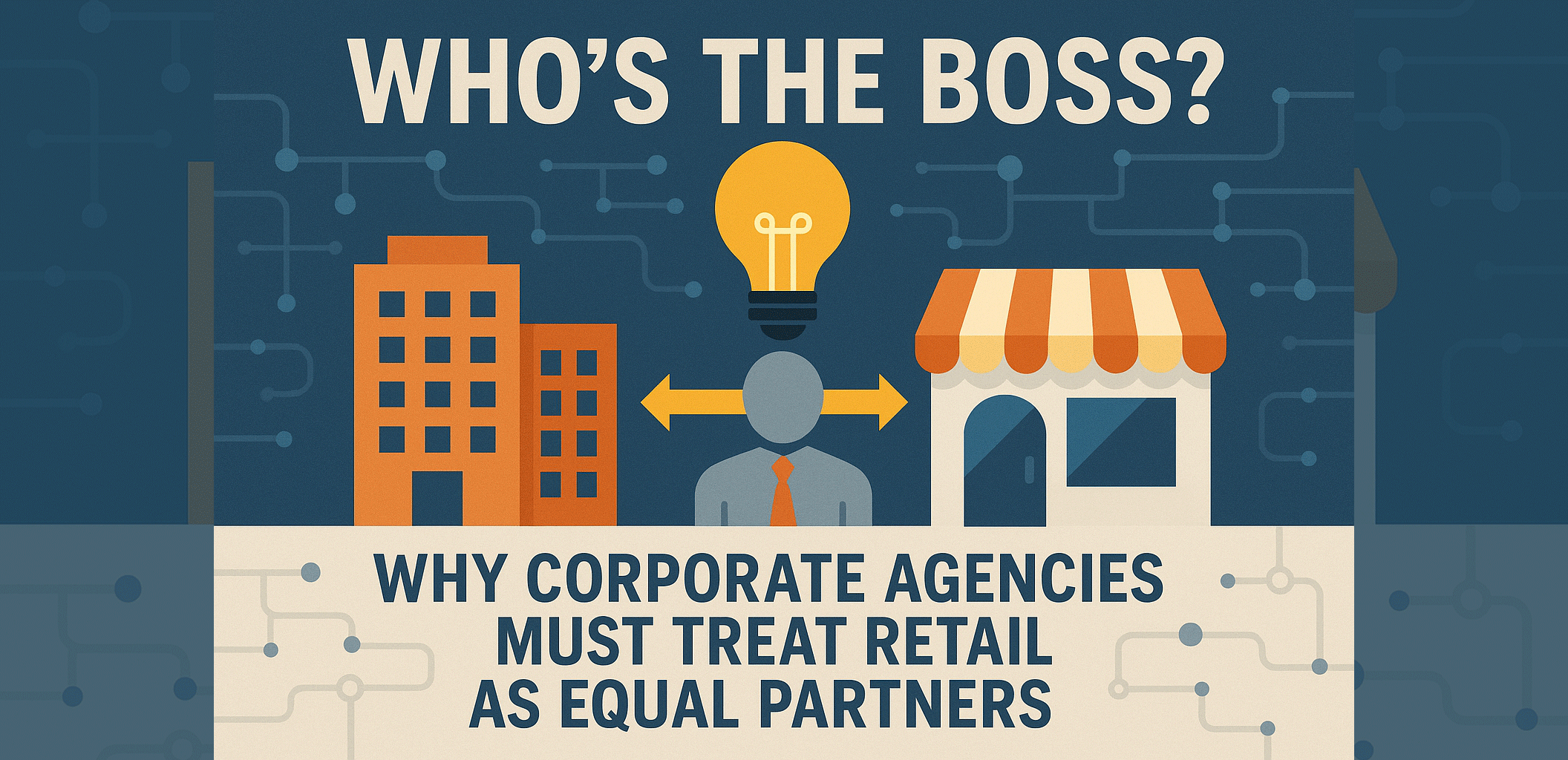Who’s the Boss? Why Corporate Agencies Must Treat Retail as Equal Partners — Before It’s Too Late

The air is thick with competitive tension. Two CEOs—one from a powerful valuation-based corporate agency, the other from a high-growth mass-market retail firm—sit down for the most critical discussion of their careers: a merger exploration.
As they discuss combining forces, one question silently fills the room: “Who’s the boss here?”
For decades, the answer felt obvious. Corporate agencies carried the institutional trust, the global affiliations, and the mandated licenses. Retail agencies were often dismissed as "cowboy" operations—fast, transactional, and volatile.
But times have changed. The market has changed. If corporate agencies don't approach this exploration with genuine humility, they will miss the window to capture exponential growth, and the true power equation will flip right under their nose.
1. The Arrogance Trap: Why "Higher Ground" Is No Longer Safe
Corporate agencies have long believed their position is safe—that agency bosses need their institutional stamp more than they need the agencies’ sales force. It’s a comfortable assumption, but it is a dangerous one in a merger scenario.
While they were busy guarding tradition and compliance, entire empires were being built around them.
- Portals went from zero to billion-ringgit valuations while corporate agencies stayed contented inside their consulting caves.
- Their own graduates became agency bosses, founding firms, and scaling sales forces larger than their parent companies.
The corporate pie shrinks with every new generation of competitors they unknowingly trained. If they had been more liberal and forward-thinking from the start, many of these successful platforms and agencies could have been their assets today, not their rivals. The value corporate agencies still hold is real. But it is eroding. Slowly. Quietly. Predictably.
2. Stop Looking Down: The Retail Ceiling Is Far Higher
It's time corporate agencies face an uncomfortable truth: The ceiling of a retail agency is higher than that of a corporate agency.
A corporate firm’s growth is capped by manpower, mandates, and strict compliance frameworks. A retail agency’s potential is capped only by imagination and systemization.
Look at Lianjia in China. It started as a retail brokerage, not a consultancy. By building Beike, a verified agent network and tech ecosystem, it became China's most valuable property platform. This transformation was driven not by global consultancy mandates, but by leveraging retail density and converting agent networks into a unified, tech-driven national infrastructure.
A traditional corporate firm simply lacks the Registered Estate Agent (REN) numbers and the grassroots networks to drive that scale. That untapped potential lies with the retail sector—and it’s still awaiting full systemization in Malaysia.
3. The Face Problem: Pride as a Growth Ceiling
Corporate agencies must now put down their pride and accept that partnership is not submission. Humility is a crucial strategy for successful merger integration.
Without it, they risk repeating the same cycle: Train ambitious graduates → graduates leave → become competitors → shrink the parent’s market share → repeat.
Partnerships with modern, systemized retail agencies—equipped with ERP systems, compliance logs, and verified inventory—are no longer optional. They are a lifeline. The firms that merge cultures, not just structures, will write the next chapter. The rest will remain stuck in the last one.
4. The New Power Equation: 1+1=11
Retail agencies haven’t yet unlocked their full potential, but they're closer than ever. The missing piece is institutional trust—something corporate agencies still possess in abundance.
When both sides bring their best—
- Corporate Agencies contribute trust, governance, and access to stable corporate pipelines.
- Retail Agencies contribute scale, speed, and consumer market depth.
Together, they don’t just add; they multiply. The synergy breaks both individual growth ceilings.
This isn't about who leads the merged entity. It's about who dares to share the value.
5. To the Corporate Agencies: Step Into the Sunlight
The cave of compliance once felt safe. Now it's a cage.
While you guarded your title, others built ecosystems. While you prized control, others scaled networks. You still have the trust—but trust without market reach is a fading currency. The market no longer rewards those who know the rules; it rewards those who build the rails.
Come out. Partner up. Treat retail agencies as equals—not juniors, not vendors. See them for what they are becoming: the next great infrastructure of real estate.
6. To the Agency Bosses: Choose Graduates, Not Ghosts
But if the high-class corporate firms refuse to deal as equals, you don't need them. Look to their most valuable asset: their ambitious graduates.
These graduates understand both worlds, but they struggle to launch independent practices due to the critical hurdle of gaining bank panel appointments. Banks require stability and verifiable workflow.
This is your leverage. The retail agency controls the mass volume of subsale cases, which is the lifeblood of valuation work. Use this volume as a bargaining chip with banks to help the corporate graduate establish a new, compliant valuation branch within your ecosystem.
If you can't bridge with the traditional firms, partner with their talented graduates. Assist them with their bank panel entry, and they will thank you by building a new architecture of trust and scale that circumvents the slow-moving legacy firms entirely.
Final Word: Respect Builds Moats
The Malaysian real estate landscape doesn't need another boss. It needs builders—firms willing to combine institutional wisdom with entrepreneurial fire.
Corporate agencies must drop their hierarchy in the merger talks. Retail agencies must rise to professionalism.
Because when both sides walk as equals, 1+1 doesn't just make 2—it makes 11.











































































































